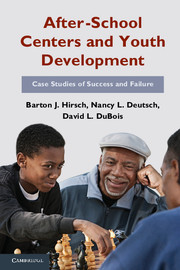Book contents
- Frontmatter
- Contents
- Figure and Tables
- Preface
- Introduction
- Midwest Center
- North River Center
- 6 A Study of Organizational Dysfunction
- 7 Undercutting Tweetie: The Trials and Tribulations of a Youth Leader
- 8 Beyonce: A Good Friend Is Hard to Find (and Keep)
- 9 Putting It All Together: North River and Midwest Centers
- West River Center
- Conclusion
- Appendix Data Sources
- References
- Index
8 - Beyonce: A Good Friend Is Hard to Find (and Keep)
Published online by Cambridge University Press: 05 June 2012
- Frontmatter
- Contents
- Figure and Tables
- Preface
- Introduction
- Midwest Center
- North River Center
- 6 A Study of Organizational Dysfunction
- 7 Undercutting Tweetie: The Trials and Tribulations of a Youth Leader
- 8 Beyonce: A Good Friend Is Hard to Find (and Keep)
- 9 Putting It All Together: North River and Midwest Centers
- West River Center
- Conclusion
- Appendix Data Sources
- References
- Index
Summary
Beyonce hardly fits the profile of risk that we have come to associate with young people living in low-income urban neighborhoods. Risk for school failure? Beyonce has made the Honor Roll the last two years and counts reading as one of her favorite pastimes. Risk for becoming involved in a gang or behaviors such as substance use, premature sexual activity, or violence? It is difficult to envision any of these scenarios on the immediate horizon for Beyonce. In fact, whereas all of these activities typically arise in the context of relationships with peers, what is most outstanding about Beyonce is her overall lack of positive or rewarding ties with other youngsters her age. Rather than getting in with the “wrong crowd,” Beyonce is experiencing great difficulty getting in with any crowd. It is precisely these distinguishing characteristics that make the experiences of this ten-year-old African-American girl during her year at the club so instructive and important. As we shall see, Beyonce’s story illustrates how after-school centers can be of significant benefit to youth whose greatest liabilities have little in common with prevailing stereotypes of urban risk. It is equally vivid in highlighting how limitations in programs, organizational practices, and mentoring can lead centers to fall well short of the mark in responding to the needs of such young people.
- Type
- Chapter
- Information
- After-School Centers and Youth DevelopmentCase Studies of Success and Failure, pp. 183 - 207Publisher: Cambridge University PressPrint publication year: 2011



